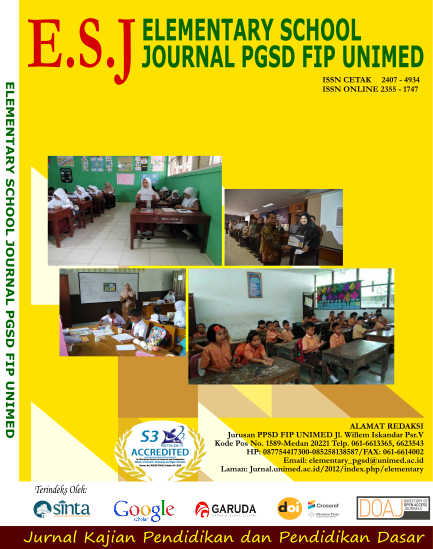21st Century Learning: 4C Skills In Case Method And Team Based Project Learning
DOI:
https://doi.org/10.24114/esjpgsd.v13i2.44522Abstract
The life of the 21st century presents its own challenges in the world of education, namely how in the learning process students are provided with skills to survive in the global world of the 21st century. The purpose of this study is to describe how well the 2nd century (4C) skills possessed by Early Childhood Education Teacher students are in case-based lectures and team based projects. The approach used in this research is quantitative and the method used is descriptive. The sample in this study were 2nd, 4th, and 6th semester students, totaling 450 students. The data collection technique is through filling out questionnaires about 4C skills which are carried out by self and peer assessment online by students. The results show that students' critical thinking and creativity are in the good category with an average critical thinking score of 83.7 and creativity of 85.4. Meanwhile, the communication (87.4) and cooperation skills (89.7) of students are in the very good category. Case-Method and team-based projects learning can help develop 4C skills as 21st century skills.Keywords: 21st century learning, critical thingking, creativity, communication, collaboration, 4C skillsReferences
Aliftika, O., & PurwantoUtari, S. (2019). Profil Keterampilan abad 21 siswa SMA pada pembelajaran Project Based Learning (PJBL) materi gerak lurus. WaPFi (Wahana Pendidikan Fisika), 4(2), 141“147.
Aslamiah, A., Abbas, E. W., & Mutiani, M. (2021). 21st-Century Skills and Social Studies Education. The Innovation of Social Studies Journal, 2(2), 82. http://dx.doi.org/10.20527/iis.v2i2.3066
Bani-Hamad, A. M. H., & Abdullah, A. H. (2019). The Effect of Project-Based Learning to Improve the 21st Century Skills among Emirati Secondary Students. International Journal of Academic Research in Business and Social Sciences, 9(12), 560“573. http://dx.doi.org/10.6007/IJARBSS/v9-i12/6749
Changwong, K., Sukkamart, A., & Sisan, B. (2018). Critical thinking skill development: Analysis of a new learning management model for Thai high schools. Journal of International Studies, 11(2), 37“48. https://doi.org/10.14254/2071-8330.2018%2F11-2%2F3
Edy Purwanto. (2016). Metodologi Penelitian Kuantitatif. Pustaka Pelajar.
Hadkaew, P., & Liewkongsthaporn, W. (2016). Developing Students ™ 21 Century Skills through Project-Based Learning : Mathematics Teachers ™ Perception and Practice. SEAMEO Conferences, April, 20“21. http://dx.doi.org/10.13140/RG.2.1.2124.8406
Husna Handayani, P. (2017). Pengembangan Kreativitas Anak Usia Dini Dalam Keluarga. Jurnal Keluarga Sehat Sejahtera, 15(2), 46“56. https://doi.org/10.24114/JKSS.V15I2.8774
Idris, T. (2018). Profil Berpikir Kritis Mahasiswa Program Studi Pendidikan Biologi SeKota Pekanbaru: Critical Thinking Profile of Biology Education Departement Student in Pekanbaru City. Bioedusiana, 3(1), 1“7. http://dx.doi.org/10.34289/277898
Junedi, B., Mahuda, I., & Kusuma, J. W. (2020). Optimalisasi keterampilan pembelajaran abad 21 dalam proses pembelajaran pada Guru MTs Massaratul Mut™allimin Banten. Transformasi: Jurnal Pengabdian Masyarakat, 16(1), 63“72. https://doi.org/10.20414/transformasi.v16i1.1963
Kusuma, E. D., Gunarhadi, G., & Riyadi, R. (2018). The Strategies to Improve Critical Thinking Skills through Problem-Based Quantum Learning Model at Primary School. International Journal of Multicultural and Multireligious Understanding, 5(4), 123. https://doi.org/10.18415/IJMMU.V5I4.213
Lestari, D., Mulyani, E. ., & Susanti, R. (2016). Pengembangan Perangkat Blended Learning Sistem Saraf Manusia Untuk Meningkatkan Keterampilan Berpikir Kritis. Journal of Innovative Science Education, 5(1), 83“93.
Marchellina, A., & Qomariyah, N. (2022). BioEdu. 11(2).
Nursulistyo, E. D., Siswandari, S., & Jaryanto, J. (2021). Model Team-Based Learning dan Model Problem-Based Learning Secara Daring Berpengaruh terhadap Kemampuan Berpikir Kritis Siswa. Mimbar Ilmu, 26(1), 128. https://doi.org/10.23887/MI.V26I1.32321
Nurzaman. (2017). The Use of Problem-Based Learning Model to Improve Quality Learning Students Morals. Journal of Education and Practice, 8(9), 234“248.
Partono, P., Wardhani, H. N., Setyowati, N. I., Tsalitsa, A., & Putri, S. N. (2021). Strategi Meningkatkan Kompetensi 4C (Critical Thinking, Creativity, Communication, & Collaborative). Jurnal Penelitian Ilmu Pendidikan, 14(1), 41“52. https://doi.org/10.21831/JPIPFIP.V14I1.35810
Qalbi, Z., & Putera, R. F. (2022). Research & Learning in Faculty of Education Penggunaan Model Problem Based Learning sebagai Upaya Peningkatan Creative Thinking pada Mata Kuliah Seminar Isu Terkini PAUD Berorie. JOTE: Journal On Teacher Education, 3, 317“327.
Rajagukguk, S. N., Gaol, R. L., HS, D. W. S., & Tanjung, D. S. (2022). Penerapan Project Based Learning Untuk Meningkatkan Hasil Belajar Siswa Sekolah Dasar Kelas V Tema Lingkungan Sahabat Kita. Elementary School Journal Pgsd Fip Unimed, 12(4), 348.
Rifa, Hanifa Mardhiyah., Sekar, Nurul Fajriyah Aldriani, F. C., & Zulfikar, M. R. (2021). Pentingnya Keterampilan Belajar di Abad 21 sebagai Tuntutan dalam Pengembangan Sumber Daya Manusia. 12(1), 29“40. https://doi.org/10.31849/LECTURA.V12I1.5813
Sari, N. (2022). Penerapan Pembelajaran Berbasis Pemecahan Kasus (Case Method) untuk Menumbuhkan Generasi Sadar Pajak pada Mata Kuliah Perpajakan Program Studi Pendidikan Ekonomi FKIP Universitas Jambi Pembelajaran perpajakan pada Program Studi Pendidikan Ekonomi. 665“673.
Simanjuntak, M. D. R. (2019). Membangun Ketrampilan 4 C Siswa Dalam Menghadapi Revolusi Industri 4.0. Prosiding Seminar Nasional Fakultas Ilmu Sosial Universitas Negeri Medan, 3, 921“929.
Simanjuntak, S. S. (2022). Hubungan Interaksi Sosial dengan Hasil Belajar pada Siswa Sekolah Dasar. ESJ: Elementary School Journal, 12(2), 128“135. http://dx.doi.org/10.24114/esjpgsd.v12i2.38396
Situmeang, T., Ansari, K., & Yusnadi. (2022). Pengembangan Model Pembelajaran Team Assested Individualoization Berbasis Metakognisi untuk Meningkatkan Kemampuan Berpikir Kreatif Menulis Siswa. 62“74. https://doi.org/10.24114/esjpgsd.v12i1.34922
Situmorang, A. S. (2017). Efektivitas Model Team Based Learning (TBL) Untuk Meningkatkan Prestasi Belajar Mahasiswa Pada Mata Kuliah Struktur Aljabar. 3(2), 31“39.
Sugiyono. (2018). Metodologi Penelitian Pendidikan. Alfabeta.
Yulianda, Putri Rahmawati, & Mohammad, Salehudin. (2021). Optimalisai Pembelajaran Abad 21 Pada SMP dan SMA. Journal of Instructional and Development Researches, 1(3), 112“122. https://doi.org/10.53621/jider.v1i3.67
Zain, A. R., & Jumadi. (2018). Effectiveness of guided inquiry based on blended learning in physics instruction to improve critical thinking skills of the senior high school student. Journal of Physics: Conference Series, 1097(1). https://doi.org/10.1088/1742-6596%2F1097%2F1%2F012015
Zhang, L., Zhang, H., & Wang, K. (2020). Media Literacy Education and Curriculum Integration: A Literature Review. International Journal of Contemporary Education, 3(1), 55. http://dx.doi.org/10.11114/ijce.v3i1.4769
Zubaidah, S. (2019). Memberdayakan Keterampilan Abad Ke-21 melalui Pembelajaran Berbasis Proyek. Seminar Nasional Nasional Pendidikan Biologi, October, 1“19.
Downloads
Published
Issue
Section
License
Copyright (c) 2023 Peny Husna Handayani, Sariana Marbun, Dwi Maya Novitri

This work is licensed under a Creative Commons Attribution 4.0 International License.

Elementary School Journal PGSD FIP UNIMED is licensed under a Creative Commons Attribution 4.0 International License.
ESJ : Elementary School Journal PGSD FIP UNIMED by PGSD Universitas Negeri Medan. p-ISSN : 2407-4934 | e-ISSN : 2355-1747

